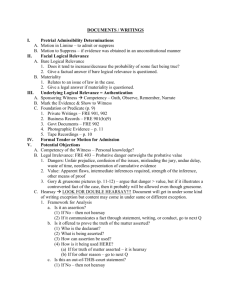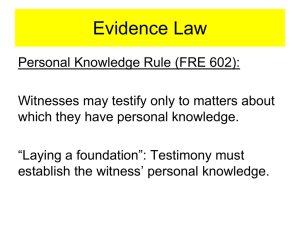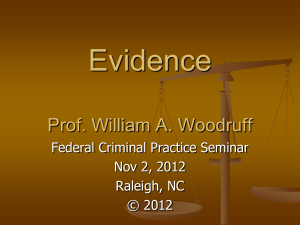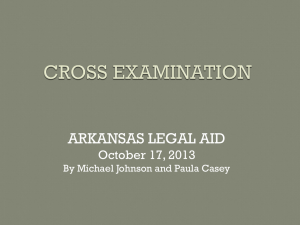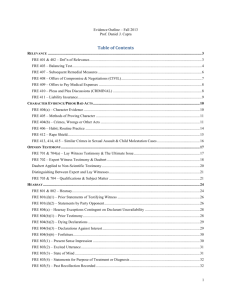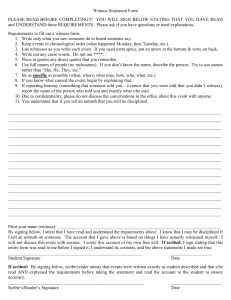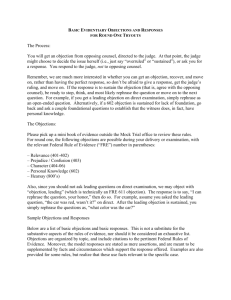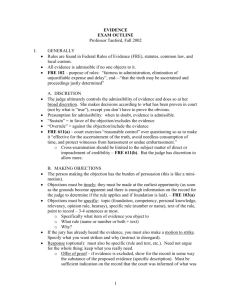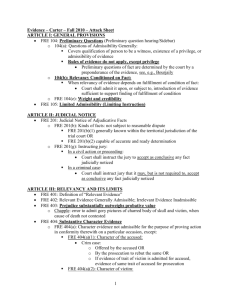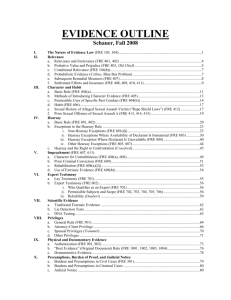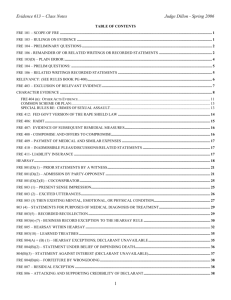2. Common Objections Chart
advertisement
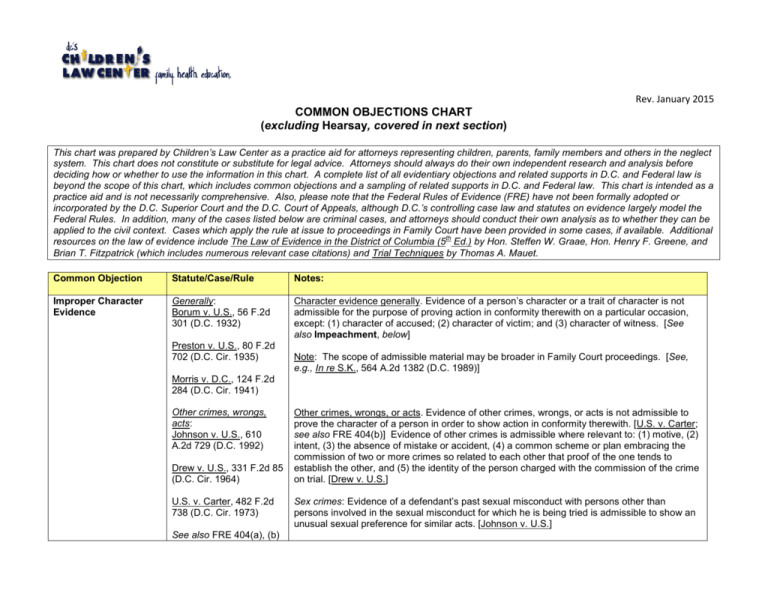
Rev. January 2015 COMMON OBJECTIONS CHART (excluding Hearsay, covered in next section) This chart was prepared by Children’s Law Center as a practice aid for attorneys representing children, parents, family members and others in the neglect system. This chart does not constitute or substitute for legal advice. Attorneys should always do their own independent research and analysis before deciding how or whether to use the information in this chart. A complete list of all evidentiary objections and related supports in D.C. and Federal law is beyond the scope of this chart, which includes common objections and a sampling of related supports in D.C. and Federal law. This chart is intended as a practice aid and is not necessarily comprehensive. Also, please note that the Federal Rules of Evidence (FRE) have not been formally adopted or incorporated by the D.C. Superior Court and the D.C. Court of Appeals, although D.C.’s controlling case law and statutes on evidence largely model the Federal Rules. In addition, many of the cases listed below are criminal cases, and attorneys should conduct their own analysis as to whether they can be applied to the civil context. Cases which apply the rule at issue to proceedings in Family Court have been provided in some cases, if available. Additional th resources on the law of evidence include The Law of Evidence in the District of Columbia (5 Ed.) by Hon. Steffen W. Graae, Hon. Henry F. Greene, and Brian T. Fitzpatrick (which includes numerous relevant case citations) and Trial Techniques by Thomas A. Mauet. Common Objection Statute/Case/Rule Notes: Improper Character Evidence Generally: Borum v. U.S., 56 F.2d 301 (D.C. 1932) Character evidence generally. Evidence of a person’s character or a trait of character is not admissible for the purpose of proving action in conformity therewith on a particular occasion, except: (1) character of accused; (2) character of victim; and (3) character of witness. [See also Impeachment, below] Preston v. U.S., 80 F.2d 702 (D.C. Cir. 1935) Note: The scope of admissible material may be broader in Family Court proceedings. [See, e.g., In re S.K., 564 A.2d 1382 (D.C. 1989)] Morris v. D.C., 124 F.2d 284 (D.C. Cir. 1941) Other crimes, wrongs, acts: Johnson v. U.S., 610 A.2d 729 (D.C. 1992) Drew v. U.S., 331 F.2d 85 (D.C. Cir. 1964) U.S. v. Carter, 482 F.2d 738 (D.C. Cir. 1973) See also FRE 404(a), (b) Other crimes, wrongs, or acts. Evidence of other crimes, wrongs, or acts is not admissible to prove the character of a person in order to show action in conformity therewith. [U.S. v. Carter; see also FRE 404(b)] Evidence of other crimes is admissible where relevant to: (1) motive, (2) intent, (3) the absence of mistake or accident, (4) a common scheme or plan embracing the commission of two or more crimes so related to each other that proof of the one tends to establish the other, and (5) the identity of the person charged with the commission of the crime on trial. [Drew v. U.S.] Sex crimes: Evidence of a defendant’s past sexual misconduct with persons other than persons involved in the sexual misconduct for which he is being tried is admissible to show an unusual sexual preference for similar acts. [Johnson v. U.S.] Common Objection Statute/Case/Rule Notes: Cumulative Evidence Yeager v. Greene, 502 A.2d 980 (D.C. 1985) The court has discretion to control repetitive evidence introduced during trial. Henderson v. George Wash. Univ., 449 F.3d 127 (D.C. Cir. 2006) Assumes Facts Not in Evidence Lack of Foundation (including Authentication) See also FRE 403, 611 Simmons v. U.S., 940 A.2d 1014 (D.C. 2008) Super. Ct. Civ. R. 43-I, 44 Campbell v. Willis, 290 F. 271 (D.C. 1923) Anderson v. D.C., 48 A.2d 710 (D.C. 1946) Hearsay Improper Impeachment It is improper for an attorney to make an argument to the jury based on facts not in evidence or not reasonably inferable from the evidence. All exhibits and testimony must have necessary foundations established before they can be admitted in evidence. [See also Relevance below] Lay and expert opinion testimony must have a proper factual basis on which the opinion is based. [See also Improper Opinions below] Writings and conversations must be authenticated or identified to be admissible at trial. [Campbell v. Willis] Giles v. D.C., 548 A.2d 48 (D.C. 1988) D.C. has a list of self-authenticating documents. [Giles v. D.C.] Taylor v. U.S., 759 A.2d 604 (D.C. 2000) Courts must make a thorough foundational inquiry before admitting demonstrative evidence to ensure its reliability. [Taylor v. U.S.] See also FRE 901-902, 1000-1004 Note: The “Best Evidence Rule” has largely been abrogated by changes in the law, including the court rules, and can only be raised if there is a dispute about authenticity or accuracy. A duplicate is admissible to the same extent as the original unless: (1) there is a question of authenticity of the original or (2) it would be unfair to admit the duplicate. The original is not required if: (1) the originals are lost or destroyed, (2) the original is not obtainable, or (3) the writing, recording, or photograph is not closely related to a controlling issue. See Hearsay, covered in separate chart The credibility of a witness may be attacked by any party, including the party calling the witness. [D.C. Code §14-102(a)] D.C. Code §§14-102, -305 See also FRE 607, 608, 609, 613 Basis for impeachment 1. bias, interest, and motive [D.C. Code § 14-102(b)] 2. prior convictions [D.C. Code § 14-305, Ross v. U.S., 520 A.2d 1064 (D.C. 1987); see also FRE 609] 3. prior bad acts [Lee v. U.S., 454 A.2d 770 (D.C. 1982); see also FRE 608(b)] 4. prior inconsistent statements [D.C. Code § 14-102(b)] 5. contradictory facts [Cooper v. Safeway Stores, 629 A.2d 31 (D.C. 1993)] 6. bad reputation for truth and veracity [Bassil v. U.S., 517 A.2d 714 (D.C. 1986); see also FRE 608(a)] Common Objections Chart, page 2 Common Objection Statute/Case/Rule Notes: Improper Opinion (including experts) Dyas v. U.S., 376 A.2d 827 (D.C. 1977) Lay witnesses can give opinions/inferences only where the opinion is based on the witness’ perception of an event and is helpful to the jury in understanding the facts. Trial judges are given broad discretion in admitting testimony of lay witnesses. [U.S. v. Williams] In re Melton, 597 A.2d 892 (D.C. 1991) In re L.L., 653 A.2d 873 (D.C. 1995) In re Ca.S., 828 A.2d 184 (D.C. 2003) Benn v. U.S., 978 A.2d 1257 (D.C. 2009) Expert opinions. Criteria for admitting expert testimony: 1. subject matter must be so distinctively related to some science, profession, business, or occupation as to be beyond the ken of the average [lay person] 2. the witness must have sufficient skill, knowledge, or experience in that the field or calling as to make it appear that his opinion or inference will probably aid the trier of fact in his search for truth 3. expert testimony is inadmissible if the state of the pertinent art or scientific knowledge does not permit a reasonable opinion to be asserted even by an expert Jones v. U.S., 990 A.2d 970 (D.C. 2010) [Dyas v. U.S. See also Daubert v. Merrell Dow Pharmaceuticals, 509 U.S. 579 (1993) (supplants Frye v. U.S., 293 F. 1013 (D.C. Cir. 1923) which asked the court to determine whether evidence was generally accepted by relevant scientific community)] Gardner v. U.S., 999 A.2d 55 (D.C. 2010) Note: Statements relied on by experts may be admissible (even if hearsay) but only to show basis of experts’ opinion (not for the truth of the matter asserted). [In re Ca.S.; Gardner v. U.S.] In re A.B., 999 A.2d 36 (D.C. 2010) Note: Experts are permitted to rely on the opinion of another expert in formulating their opinion when such reliance is reasonable in the experts’ particular field. [In re A.B.] Jones v. U.S., 27 A.3d 1130 (D.C. 2011) To distinguish between lay and expert testimony, a court must look at the reasoning process by which the witness reached his proffered opinion. [King v. U.S., 74 A.3d 678 (D.C. 2013)] U.S. v. Williams, 212 F.3d 1305 (D.C. Cir. 2000) Parol Evidence Rule See also FRE 701-702 Fistere, Inc. v. Helz, 226 A.2d 578 (D.C. 1967) The Parol Evidence Rule bars admission of extrinsic oral evidence that modifies/contradicts a contract. Exceptions include: mistakes, incompleteness, ambiguities, and other uncertainties on the contract. Common Objections Chart, page 3 Common Objection Statute/Case/Rule Notes: Lack of Personal Knowledge (Competency) D.C. Code §§ 14-301, -306 Competency depends upon the witness’ capacity to observe, remember, narrate, and understand the duty to tell the truth. [See generally FRE 601] Every person is competent to be a witness except if there is a statutory disqualification: • Lack of personal knowledge • Uncorroborated testimony against deceased/incapable person • Judge/jury as witness [See also FRE 605-606] See also FRE 601-606 Prejudice Outweighs Probativeness Privileged Communication Henderson v. George Wash. Univ., 449 F.3d 127 (D.C. Cir. 2006) See also FRE 403 D.C. Code §§ 14-300, -306, -307, 22-4124 In re N.H., 569 A.2d 1179 (D.C. 1990) In re O.L., 584 A.2d 1230 (D.C. 1990) In re N.P., 882 A.2d 241 (D.C. 2005) Competency questions not governed by statute are left to the court’s discretion [See generally FRE 601]: • Age: [Johnson v. U.S., 364 A.2d 1198 (D.C. 1976), Barnes v. U.S., 600 A.2d 821 (D.C. 1991), Galindo v. U.S., 630 A.2d 202 (D.C. 1993), Beausoleil v. U.S., 107 F.2d 292 (D.C. Cir. 1939)] • Intoxication: [Fowel v. Continental Ins. Co., 55 A.2d 205 (D.C. 1947)] • Unsound Mind: [Mitchell v. U.S., 609 A.2d 1099 (D.C. 1992)] • Mental Retardation: [U.S. v. Benn, 476 F.2d 1127 (D.C. Cir. 1972) (stating that it is in the trial judge’s sound discretion whether to order a psychiatric evaluation for a witness)] • Drug Addiction: [U.S. v. Kearney, 420 F.2d 170 (D.C. Cir. 1969)] A trial court may prevent the introduction of evidence “if its probative value is substantially outweighed by the danger of unfair prejudice, confusion of the issues, or misleading the jury, or by considerations of undue delay, waste of time, or needless presentation of cumulative evidence.” In considering a trial judge’s application of Rule 403, the Supreme Court has stated the standard of review as “abuse of discretion.” [Henderson v. George Wash. Univ.] Communications made in confidence between parties having certain relationships are barred from disclosure upon objection. • husband-wife [D.C. Code §§14-306, 22-4124. But see D.C. Code §§ 4-1321.05, 162359 (waiving the privilege under certain circumstances)] • physician-patient [D.C. Code §14-307. But see D.C. Code §§ 4-1321.05, 16-2359 (waiving the privilege under certain circumstances)] • attorney-client [common law privilege not governed by D.C. statute] • clergy-penitent [D.C. Code §14-300] But see In re M.L., 28 A.3d 520 (D.C. 2011) (Results of court-ordered mental health evaluations are not protected by doctor-patient privilege) See also FRE 501 Common Objections Chart, page 4 Common Objection Statute/Case/Rule Notes: Lack of Relevance Silverfarb v. U.S., 40 A.2d 82 (D.C. 1944) One fact is relevant to another when the existence of the one, taken alone or in connection with other facts, render the existence of the other more certain or more probable. [Silverfarb v. U.S.] Reavis v. U.S., 395 A.2d 75 (D.C. 1978) In re L.C., 92 A.3d 290 (D.C. 2014) See also FRE 401-403 Common Objections Related to the Form of the Question Argumentative Beyond the Scope of Direct Examination Beyond the Scope of Cross Examination Compound Question Confusing, Misleading, Ambiguous, Vague, Unintelligible Leading Question See generally FRE 403, 611(a) Super. Ct. Civ. R. 43(b) Arnstein v. U.S., 296 F. 946 (D.C. 1924) See also FRE 611 See generally FRE 403, 611(a) See generally FRE 403, 611(a) Super. Ct. Civ. R. 43(b) Green v. U.S., 348 F.2d 340 (D.C. Cir. 1965) Misstates Evidence or Misquotes Witness Speculative Question See also FRE 611 See generally FRE 403, 611(a) See generally FRE 403, 611(a) First, the evidence must relate logically to the fact it is offered to prove. Second, the fact sought to be established by the evidence must be material. Finally, the evidence must be adequately probative of the fact it tends to establish. It must tend to make the existence or nonexistence of a fact more or less probable than would be the case without that evidence. [Reavis v. U.S.] Note: The scope of relevant material may be broader in Family Court proceedings. See, e.g., In re M.D., 758 A.2d 27 (D.C. 2000), In re J.A., 601 A.2d 69 (D.C. 1991) (a determination of best interests places a responsibility on the judge to know as much as possible about the situation). This is a question that is essentially an argument to the jury. The question elicits no new information. It states a conclusion and asks the witness to agree. Cross-examination must be limited “only upon the subject matter of the examination in chief” and matters affecting the credibility of the witness. [Super. Ct. Civ. R. 43(b)] Redirect must similarly be limited to the subject matter of the cross-examination that came before it. This is a question that brings up two separate facts within a single question. A question must be posed in a reasonably clear and specific manner so that the witness can reasonably know what information the examiner is eliciting. A leading question suggests the desired answer to the witness. Generally improper during direct examination, unless the witness is considered hostile or adverse. [Super. Ct. Civ. R. 43(b)] Leading questions on direct may be proper if necessary to develop the witness’ testimony. This is a question that misstates and distorts evidence or misquotes a witness. Any question that asks the witness to speculate or guess is improper. Witnesses are permitted to give estimates and approximations [e.g. distance, time, speed, and age]. Common Objections Chart, page 5 Common Objections Related to the Form of the Answer Asked and Answered Yeager v. Greene, 502 A.2d 980 (D.C. 1985) Questions and answers previously elicited and made by the same party should not be repeated to avoid needless consumption of time. Henderson v. George Wash. Univ., 449 F.3d 127 (D.C. Cir. 2006) Conclusions See also FRE 403, 611 Deloach v. U.S., 307 F.2d 653 (D.C. 1962) A conclusion is a deduction drawn from a fact or series of facts. Witnesses should testify only to facts. See also FRE 701 Other Narrative Answer Unresponsive Muttered Statements by Witnesses and other Extrinsic Evidence Unresponsive, Volunteered Failure to Object Yeager v. Greene, 502 A.2d 980 (D.C. 1985) See also FRE 611 Garrett v. U.S., 20 A.3d 745 (D.C. 2011) A long narrative answer is objectionable because it does not give opposing counsel a reasonable opportunity to make a timely objection. Extrinsic evidence, such as muttered comments by a witness, is not necessarily properly included for jury determination. The judge should inquire at least a limited amount into the jury’s perception of the utterance and any potential exposure to extrinsic evidence. See generally FRE 403, 611(a) An answer that does not directly respond to a question is objectionable. Portions of an answer that go beyond what is necessary to answer the question are objectionable. Once evidence is admitted without objection, it may be properly considered by the trier of fact and given its full probative value, and reversal will not be obtained absent plain error. Eldridge v. U.S., 492 A.2d 879 (D.C. 1985) Rose v. U.S., 629 A.2d 526 (D.C. 1993) In re S.C.M., 653 A.2d 398 (D.C. 1995) In re N.P., 882 A.2d 241 (D.C. 2005) Common Objections Chart, page 6
